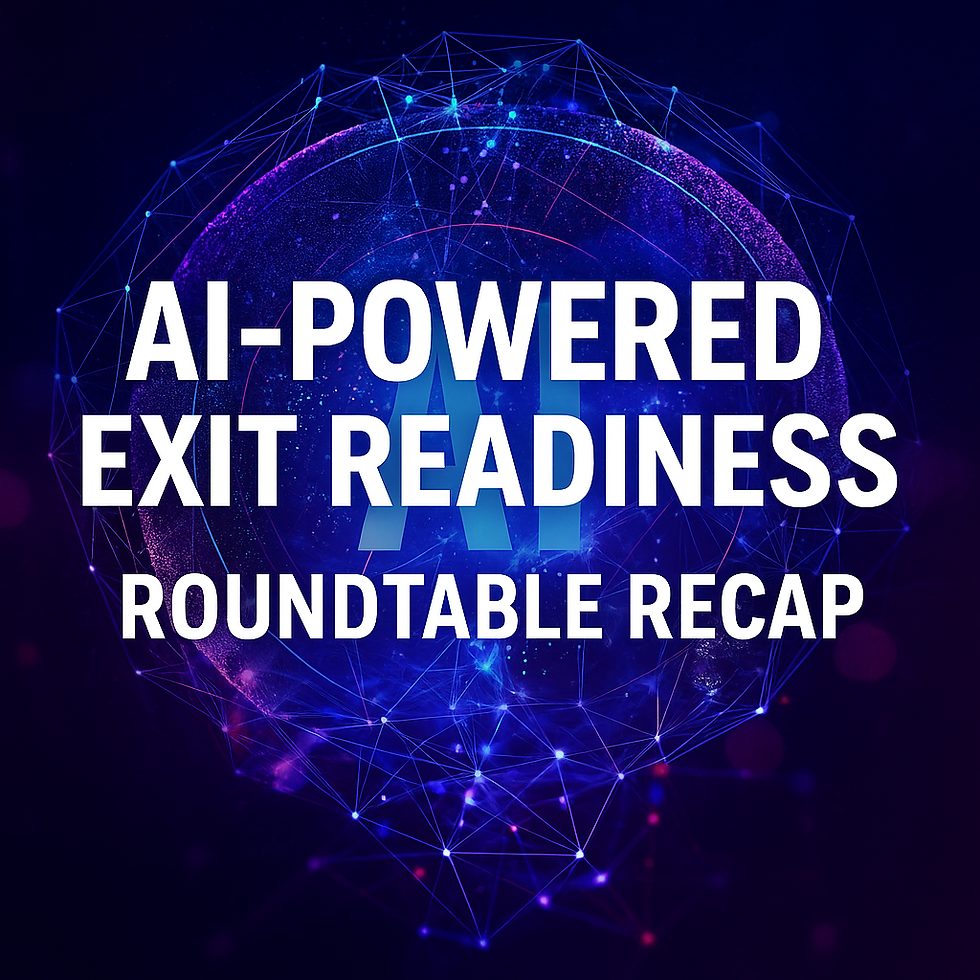PL3 Virtual Roundtable Recap: Deal Killers You Can’t See in a Spreadsheet - How AI Is Changing Due Diligence
- William Gladhart
- Oct 6, 2025
- 3 min read
Updated: Oct 8, 2025
Roundtable Date: September 25, 2025
Hosted by: Performance Leadership Learning Lab (PL3) Team
Most deals don’t fail because of the numbers you see - they fail because of what you don’t. Leadership gaps, cultural misalignment, and operational blind spots rarely appear on a balance sheet, yet they can quietly erode enterprise value and derail post-close performance.
In September’s PL3 Virtual Roundtable, experts from Exit Systems AI, The Crucible and The Culture Think Tank explored how AI-standardized metrics are uncovering these hidden risks and reshaping the diligence process. With AI-enabled dashboards and cleaner data governance, investors and founders can now measure the human side of performance with the same clarity as EBITDA.
Uncovering What Spreadsheets Miss
The panel began with Charles Dents of Exit Systems AI, who highlighted how AI-driven diagnostics normalize company data, benchmark performance against peers, and surface risks around customer concentration, pricing power, and leadership autonomy. These tools, he noted, give both investors and advisors a “systems-level view” that strengthens pre-LOI and 100-day planning.
Building on this, Lindsay Guzowski of The Crucible emphasized the KPIs that matter most for due diligence readiness: financial (margins, revenue growth, CAC/LTV), operational (DSO, inventory turnover, supply chain health), customer/market (churn, NPS, TAM), and human capital (culture, turnover, leadership depth). AI, she emphasized, makes standardization easier - but only if data governance is strong enough to ensure accuracy and trust.
Mark Iorio of BCAT stressed the role of leadership dependence. Too often, value collapses when buyers see organizations that are fragile rather than resilient. By broadening the leadership bench and building alignment across culture and brand promise, companies reduce founder risk and strengthen buyer confidence.
William Lindstrom of The Culture Think Tank drove home the point that exit readiness is business readiness. Founders who aren’t emotionally prepared can stall deals or erode valuations. AI tools, he noted, are beginning to help advisors detect early signs of hesitation and measure leadership alignment, but the deeper solution is treating exit planning as an ongoing process rather than a last-minute event.
Key Takeaways
AI is reshaping diligence by speeding prep, normalizing financials, and enabling real-time operational insights
Data governance matters - poor data quality undermines dashboards and investor trust.
Leadership depth reduces fragility - strong cultural alignment and emergent leaders increase enterprise resilience.
Exit planning is a process, not a transaction - early, ongoing preparation leads to higher valuations and smoother transitions
Red flags remain - customer concentration, weak succession, culture mismatch, IP risks, and disengaged employees continue to undermine deals.
This session made one thing clear - spreadsheets alone don’t tell the whole story. With AI-standardized metrics, investors and founders can now uncover the hidden risks - and hidden value - that define long-term success.
If you found this Roundtable valuable, join us on October 30, 1:30P CST for a PL3 Virtual Roundtable titled Bridging Cultures, Building Value - The Leadership Imperative in M&A. Register at this LINK to reserve your spot.
If you missed any of our Virtual Roundtable sessions or want to revisit the conversation, you can access the replays on the PL3 YouTube Channel.
Will Gladhart is Chief Marketing Officer at The Culture Think Tank & PL3, where he leads brand strategy, content, and community engagement.



